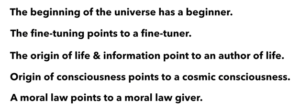Josh McDowell's Blog, page 29
January 19, 2019
Can We Trust God?
So here’s the thing: many of us don’t trust God. I’ll go a step further: NOT one of us fully trusts God every single moment. (Or if you do, WOW! You’re amazing!) But if we don’t learn to trust God, we’ll never gain a firm foundation for our Christian faith. We’ll always be unsure if He sees us as loved and accepted and important. (He does!!!!)
If we view God as a genie, that’s not trust. If we view God as a grumpy guy we have to butter up, that’s not trust. If we merely hope when we pray, that’s not trust. So how do we learn to trust God, even when it feels like He doesn’t exist? We can start with deciding that we can take His Word as truth. By reading the Bible, and choosing to believe what it says about how God sees us, we can begin to trust that He really is our loving, caring creator.
Overheard: “If you don’t have a relationship with God, it’s quite possible it’s because you don’t open your Bible.”

In What Do We Trust?
When you think about it, we sure do trust a lot of man-made things that can fail us at any moment. Our cars, for example, and other high-tech transporters such as trains and airplanes. Think about the latter for a second. We willingly put ourselves in a metal can that hurtles through the sky at 500+ mph, at a commercial cruising altitude of 35,000 feet! That’s a long fall to the ground if the wing snaps or the engine fails!
We put our trust in stop lights. And stop signs. And the blinking “Walk” sign at crosswalks. We trust that the bank will return our money to us when we want it. The bank, itself, trusts us to pay off our credit cards and house loans. That trust isn’t always rewarded.
Too, we trust our well-being — if not our very lives — to other people. Every time we step into a new relationship, we open ourselves up to potential joy and chest-crushing pain. Even when we open our arms to offer a hug, we expose our hearts to rejection.
Some of us trust in philosophies so bizarre that they require not just blind faith, but a total dismissal of reality.
And most of us put a TON of trust in ourselves. We’ve been influenced by society to believe that our individual fates are entirely due to our own efforts. Say, what?!
In God We Trust?

Have you ever looked at your coins or bills and wondered, “Why does it say ‘In God We Trust’?” Well, in our not too distant history, the United States was a God-fearing nation. The whole point for many in moving to America, in fact, has been to gain religious freedom.
Though this motto currently remains on our national currency, I think we can all agree it’s now a minority view. Some are lobbying to have the statement removed, as it is a tangible reminder that the U.S. once respectfully acknowledged God. Will the replacement text be “In Ourselves We Trust”?
Primarily through our increasingly secular media and educational systems, we’ve been conditioned away from trusting God and toward trusting in the inherent power of humanity. We think our current self and world views are perfectly fine. We have no idea just how immoral we’ve become. As I overheard one person put it, “We don’t even know what immorality is.” #ouch #Godknows
Many people simply can’t stand a biblical standard of morality, because it stops them from feeling good about their habits and behaviors. They believe it’s perfectly acceptable to blame God for what they think should be different in the world, and to use their view as justification for rejecting Him. Hold up! Do we seriously believe we have the right to judge and condemn God?!
God Is Trustworthy!
 Friends, are you as tired as I am of the hamster wheel that society tells us to keep super-powered to achieve our “best life”? What a truckload of poo! In our frenetic chasing of power and wealth and popularity, we lose sight of our real purpose. We’re not here to amass the most toys, Facebook likes, and YouTube views! We’re here to live wonderfully satisfying lives that honor God and serve others.
Friends, are you as tired as I am of the hamster wheel that society tells us to keep super-powered to achieve our “best life”? What a truckload of poo! In our frenetic chasing of power and wealth and popularity, we lose sight of our real purpose. We’re not here to amass the most toys, Facebook likes, and YouTube views! We’re here to live wonderfully satisfying lives that honor God and serve others.
The Bible — God’s Word to us — shares, in great detail, how we are to correctly view and respond to life. It tells us who we are! It teaches us how to love. It tells us how to forgive, and why it’s critical that we do so. It instructs us on how to deal with disappointment and failure and setbacks. And it assures us that God continues to pursue us to have a personal relationship with Him. How mind-blowing is it that the Creator of the universe wants us to know and love and trust Him?!
The very planet itself, as Sean McDowell points out, shouts, “God is real! See Him in my amazing details!”
Sure, we can live by a lower standard than God wishes for us — but we only shortchange ourselves. I dare you to give God the chance to show you that trusting Him is worth it. Start to develop that trust by opening His Word.

You are hereby challenged to take the 30-day Proverbs Challenge!
Instead of firing up Facebook first thing tomorrow morning, jump on over to the YouVersion app. It will take you just a few minutes to read the wealth of wise tips in the 31 Proverbs. Read a Proverb a day! Here’s one of my favorite bits of wisdom. #goodstuff
Double dare: post your favorite verses on Facebook! You’re going to be known for something, right? Why not for being wise?
Can Man (and Woman) Live Without Sex?

Original post by Sean McDowell here. Used with permission.
It’s no secret that our culture is hypersexualized. Music. Commercials. Movies. Internet. News. Sex is simply everywhere in our culture.
As a result, it is deeply tempting to buy the narrative that sexual experience is the surest route to happiness and fulfillment. To deny yourself sexual activity, on this view, is to undercut your own humanity.
As popular and appealing as this view may be, it is deeply mistaken.
Jesus was Single, and Fully Content
In my recent dialogue with Matthew Vines about the Bible and Homosexuality, I began my opening speech by focusing on the life and teachings of Jesus. I noted that even though Jesus was single, he was fully content.
He never married, and he did not engage in a single sex act.
And yet, in contrast to the sex-crazed narrative of our culture, he experienced profound contentment, joy, and peace with his sexuality as an adult, single male.
And remember, Jesus was truly God, but he was also truly human. He was not a sexless deity.
Jesus experienced the depths of temptation, as the author of Hebrews describes: “For we do not have a high priest who is unable to sympathize with our weaknesses, but one who in every respect has been tempted as we are, yet without sin” (4:15).
Jesus went through puberty. He had body hair. He was attracted to women. And although he never engaged in a single sex act, he was fully content with his sexuality.
Here is the bottom line: Humans can live without sex and marriage. But we weren’t designed to live without love and intimacy—and there’s a big difference.
You see, there can be sex without intimacy (e.g., a hookup). And there can be intimacy without sex (e.g., friendship).
Sex is neither necessary nor sufficient to experience the depths of human intimacy God designed us for.
Sex is Good
My point is not to downplay the value of sex. Unfortunately, the church has sometimes made the mistake of communicating that sex is bad. This could not be further from the truth!
Sex is a good gift from God for the purpose of procreation (Gen 1:28) and unity (Gen 2:24). And God intended for sex to be enjoyable between husband and wife (see Song of Solomon and Proverbs 5).
But, despite the cultural narrative, sexual activity is not essential for human flourishing or personal fulfillment. The life of Jesus puts this cultural myth to rest.
You might be thinking, “That’s easy for you to say, Sean, since you’re married and have kids.” Whether true or not (in this case, it is true) this objection is simply irrelevant to the claim itself. It is a classical genetic fallacy, which dismisses a claim because of its origins.
Nevertheless, there are many single people who make the same point.
Ed Shaw is a same-sex attracted pastor from the UK. In his book Same-Sex Attraction and the Church, Shaw argues that God is not the one who is keeping same-sex attracted men and women from experiencing intimate relationships.
Rather, it is our hypersexualized culture that cannot process non-sexual intimate relationships.
He wishes the church would put as much energy into cultivating good friendships as it does good marriages. I agree 100%.
In conclusion, consider pastor Shaw’s words:
I know there are many today who think it is a great tragedy to die a virgin. But I hope I will. Because I know that I will not have lost out on anything too significant. Because the Bible teaches me that I will have missed only the brief foretaste that sex is meant to be of the eternal reality of the perfect union between Christ and his church that I will one day experience forever (Revelation 21:1-15). Any fleeting pleasure I’ve given up in the meantime will be more than worth it then.
Amen.
Sean McDowell, Ph.D. is a professor of Christian Apologetics at Biola University, best-selling author, popular speaker, part-time high school teacher, and the Resident Scholar for Summit Ministries, California. Follow him on Twitter: @sean_mcdowell and his blog: seanmcdowell.org.
Ed Shaw, Same-Sex Attraction and the Church (Downers Grove, IL: InterVarsity Press, 2015), 112).
The post Can Man (and Woman) Live Without Sex? appeared first on Josh.org.
January 12, 2019
Is the Bible Fact or Fiction?
The contents of the Bible were written over a period of over 1500 years, by 40+ authors from every walk of life: kings, fisherman, statesmen, poets, philosophers — even peasants. Some wrote in the wilderness, others in dungeons, some in a palace, and others while on military campaigns. And they wrote from three different continents, and in three languages, Hebrew, Aramaic, and Greek. Wow!
Can a book so unique really be factually and historically true? Is the Bible, as some believe, merely a “man-made” work of fiction — or a book guided by the hand of God?
“The case for the reliability of the New Testament,” asserts scholar and prolific writer Dr. Howard Vos, “is infinitely stronger than that for any other record of antiquity.” Let’s look at why he can confidently say this.

Trusting Historical Testimony
Because you and I weren’t there to see it for ourselves, we trust that our knowledge of the past is based on verified sources: written, oral, and physical testimony. Written testimony is a written record of what happened. Oral Testimony, the primary way in ancient times of faithfully passing history from one generation to the next, relied on meticulous storytelling. Physical testimony is tangible evidence, such as a fingerprint, photograph, clay pot, or manuscript.
Let’s apply these testimonies to just two events that we’re all at least vaguely familiar with:
~ How do we know that in 1945 the first atomic bomb was dropped on Hiroshima, Japan? Because of details and facts from all three forms of testimony. Eyewitness testimony for the event is especially compelling. Recounts one 14-year-old boy: “Night came and I could hear many voices crying and groaning with pain and begging for water. Someone cried, ‘Damn it! War tortures so many people who are innocent!’ Another said, ‘I hurt! Give me water!’ This person was so burned that we couldn’t tell if it was a man or a woman. The sky was red with flames. It was burning as if scorching heaven.”
~ How do we know what the Nazis did to Jews during World War II? Because of the horrific testimony that can’t be denied by those willing to look at the facts. Credible eyewitness testimony is critical to our understanding of what really occurred in the past.
So why do scholars have to admit that Jesus really did live and die? Because evidence, even from non-biblical sources, claims that He did. Why do Christians believe Jesus also resurrected? Again, because of compelling eyewitness testimony.
The Bible’s Book of Acts, for example, is full of eyewitness testimony. Verse after verse emphasizes that people personally saw and interacted with Christ over a 40-day period after He resurrected. We’re not talking a period of four days, or forty hours! We’re talking forty days, people! Some examples:
Acts 2:32: “God has raised Jesus to life, and we are all witnesses to the fact.”
Acts 3:15: “You killed the author of life but God raised Him to life and we are witnesses to this fact.”
Acts 4:20: “As for us, we cannot help speaking about what we have seen and heard.”
We can trust that the Book of Acts is legit. Or can we???
You Can’t Prove That!
You might be thinking that historical testimony isn’t necessarily reliable. Because we all know that sometimes people lie. And sometimes they intentionally skew the truth. Maybe, you’re thinking, their memory was faulty. Or maybe the disciples just wanted to make themselves seem important or grab power!
Sorry, those aren’t reasonable suggestions. Why? Because not only were the writers of the New Testament eyewitnesses — or faithfully recorded eyewitness accounts — they appealed to the knowledge of their listeners concerning the truth about Christ. They confidently assert: “You were there. You saw Him do that. You heard him say that. You were there when He did that!” The apostles throw the whole arguments of what Jesus said and did back onto the laps of their audiences by saying, “You know as much as we know of what Jesus said and did.”
Don’t miss this critical point: the apostles presented their facts in the presence of knowledgeable, hostile people who would have immediately known if they were presenting false information.
The eyewitnesses of the events in question were still alive when the traditions were being completely formed about Christ! Even better: among those eye witnesses were bitter enemies of this new religious movement who would have contested and exposed any false statements the apostles tried to concoct or spread! That, in itself, is authentication.
The disciples could not afford to risk inaccuracy or to make stuff up, if their goal was to have people believe in Jesus.
Testing the Authenticity of a Manuscript
There are two standard tests exist by which all historical documents can be vetted.
The first test is called a historiography. The second is the external evidence test. There, scholars ask, “Is there external evidence totally apart from the book under investigation that confirms its inner testimony or accuracy?”
We’d start our testing by examining the paper and ink used to record the manuscript. Then we’d study its timeline — how far the manuscript is removed from the original (autographa). Next we would determine the manuscript’s approximate date. We could use clues such as ink color, letter size, punctuation, ornamentation, and even text division.
Want to know what scholars find when they examine the Bible’s timeline? That they can date the earliest version of the written New Testament to within fifty years of Christ’s death!
You might be thinking that’s a long gap, but let’s put the gap into perspective. The closest version we have of all other non-biblical historical documents is closer to hundreds of years. There is a 50-year gap between the New Testament and the autographa — but a 500-year gap with the Iliad!
We also can test a document via archaeology. Non-biblical historical literature verifies certain facts about Christ. We know that He lived during the time of Tiberius Cesar. That He lived a very virtuous life. That He performed miracles. That He was acclaimed to be the Messiah. that He was crucified under Pontius Pilate, on the eve of the Jewish Passover. That darkness and an earthquake occurred when He died from crucifixion. That His disciples interacted with Him for 40 days after He rose. That His disciples were willing to die for their beliefs. And that Christianity spread rapidly, as far as Rome.
Another benchmark scholars consider: how many copies of the original text exist? The more copies available to review, the easier it is to reconstruct the original document. Again, let’s compare the number of manuscripts of literature of antiquity.
Many people consider the Roman historian Tacitus to be Rome’s most important historian. Yet there are only twenty manuscripts that remain of his annals. Of Pliny the Younger, only seven manuscripts survive. Of Aristotle, only 49 manuscripts. Of the Greek historian, Herodotus, only eight manuscripts survive. Of the Iliad, 643 manuscripts exist. But of just the New Testament, scholars have confirmed the existence of 24,633 manuscripts!
The evidence for New Testament writings is so much greater than the evidence for writings of other classical authors.
Notes Josh McDowell, who once thought Christianity completely bogus until extensive research convinced him otherwise, “We can hold the New Testament in our hands and confidently say, ‘Jesus really said and did what it says.'”
In our next blog post, let’s look further at the tension between our trust and the Bible. (Hint: it often starts with our inability to trust in God.)
Catch up: The introductory post to this series. Last week’s post: Meticulous Scribe, Trusted Manuscript.
The post Is the Bible Fact or Fiction? appeared first on Josh.org.
What is the Best Definition of Love? Quick VIDEO
Original post by Sean McDowell here. Used with permission.
Sean McDowell, Ph.D. is a professor of Christian Apologetics at Biola University, best-selling author, popular speaker, part-time high school teacher, and the Resident Scholar for Summit Ministries, California. Follow him on Twitter: @sean_mcdowell and his blog: seanmcdowell.org.
The post What is the Best Definition of Love? Quick VIDEO appeared first on Josh.org.
January 8, 2019
The Lodz Torah, Abridged
“Baruch, it is certified!” Moshe exclaimed. “I simply could not wait to tell you.”
Moshe’s elation spread immediately to Baruch. He knew exactly what Moshe meant. His friend was bringing him the news he had been hoping to hear for many weeks. The rabbi had just certified the Torah that Baruch had been copying for just over a year.
It was easy for me to visualize a scene such as the one above, because over 550 years later I, too, was overwhelmed with emotion as I touched the edge of that very same Torah. I was now the owner—more precisely, I was the caretaker—of this rare ancient text. And I too was deeply moved as I held it tightly in my arms.

The Case of the Meticulous Lodz Scribe
This Torah, as it survives today, was prepared predominantly by a dedicated Ashkenazi scribe some 550 years ago. Baruch, as I am calling him, was a scribe who probably followed the typical requirement of preparing the skins, ink and traditions of precisely copying the Scripture. He certainly was a rigorously trained, highly skilled, passionate professional who was very respected in his community as a religious scholar. His work was eye straining and back breaking. He worked hours on end hunched over a table tediously copying Scripture tediously in a room dimly lit by candles or an oil lamp.
To be certified as a scribe, Baruch had to memorize 4,000 different laws and principles dictating how to copy Scripture.
Without knowing each of these laws of manuscript transcription, he would not be qualified to copy the sacred text. Let’s follow Baruch on his all-important task.
To begin, Baruch obtained ceremonially clean animal skins from a Jewish butcher. He then created the panels for the scroll. Next, Baruch carefully soaked the animal skins in water mixed with his barley leaves. For this particular scroll, he soaked five skins. The soaking softened the skins, making it easier for him to scrape off the hair and fibers.
Baruch had to make sure every letter was copied clearly and straight. Using threads as guides, he took a dull knife that would not cut through the skin and carefully scored the surface horizontally. This indented the skin slightly to form a distinguishable line. He repeated the same process vertically, creating a perfect cross-pattern grid on which to copy each and every letter of God’s written Word. Baruch believed, like all the Jewish scribes before him, that he had a solemn responsibility to reproduce every letter perfectly and clearly. Writing his letters on the grid aided him in accomplishing this goal. He knew that miscopying what God said could mean misreading, mispronouncing, and worse, misinterpreting and misunderstanding what God wants his people to know about him and his ways.
He had 304,805 letters to write, and not one of them was to touch another. The meticulous care and deliberation required meant it would take him over a year to complete this beautiful Torah.
Fear God and Worship Him
Moses wrote telling the children of Israel “to fear the Lord your God and worship him” (Deuteronomy 10:20). To fear meant to be in awe of God, to revere him and worship him as the Almighty God who shows mercy and grace to his people. That awesome reverence is clearly evident as the scribes performed their solemn duty to pass down the Scripture from one generation to another with such accuracy and exactness.
Imagine our scribe Baruch sitting down to begin his great task of copying the Lodz Torah. If he follows typical Jewish tradition he dips his new quill in the freshly prepared ink and speaks each word out loud before he writes. As his training has taught him to do, he pronounces each word correctly and copies each letter exactly. “In the beginning…” he says aloud as he forms the letters with painstaking precision. But Baruch stops before completing the last letter of the word just before the word “God.” Then according to tradition, we watch him set down his quill and ceremoniously wash his hands. He is now purifying himself and sanctifying (or making separate) the ink that will pen the name of God.
What reverence, what awe, what fear this scribe had in copying God’s sacred words! The text of God’s Word was truly sacred to these Jewish scribes.
Once Baruch completed the last letter of the last word of this Torah, it had to be certified by other scribes or the rabbi. Some traditions required three separate rabbis to check its accuracy. This meant others had to unroll this seventy-two-foot scroll to check and count every single word and all 304,805 letters. They had to be sure there was the same number of letters in this scroll compared to the Torah from which it was copied. Not only that, when they counted the words they would indicate the center word within the Torah. They knew the center word was found in Leviticus 13:33. If the center word of the new scroll did not fall exactly within verse 33, that scroll could not be certified. They did the same thing for every letter. The center letter was found in Leviticus 11:45. If the new scrolls center letter was in verse 45 then they were confident they had an exact replica of the previous Torah.
His Word is Eternal
It is overwhelming to realize that the God of the universe has superintended the writing and passing down of his words from generation to generation so that you and I can have an accurate revelation of him. He has gone to extraordinary lengths to restore the intimate relationship with you and me that he once had with the first couple in the Garden of Eden. And he has chosen the Bible as the means to reach out in human language, reveal the essence of his relational heart, and share the Good News of Christ as our salvation.
Now I hope you can understand why I felt such strong emotion when I acquired this centuries-old medieval copy of ancient Scripture. It is a tangible embodiment of all the dedication, labor, martyrdom, deprivation, and persecution that went into preserving God’s message of love to you and me.
The full version of this article by Josh McDowell can be found here.
The post The Lodz Torah, Abridged appeared first on Josh.org.
January 7, 2019
Meticulous Scribe, Trusted Manuscript
Each week we’ll look at our Christian beliefs, and whether they help us to answer these four important questions: “Why am I here?,” “What is truth?,” “Why should I believe this truth?,” and “How does this truth affect my every day life?” Can we, by daily applying God’s standards to our lives, really live the best version of life God wants for us? Let’s Journey Together to find out!
To get us started, below I share why I’m so excited about an ancient text, the Lodz Torah, which I had the amazing honor of acquiring. I named it in memory of the Jews who suffered and died at the hands of the Nazis during WW II.
The rare scroll showcases the strict standards historical scribes followed to ensure they faithfully copied older biblical texts. What these strict standards mean, of course, is that we can trust the validity of the Scriptures! We can open up the Bible and pretty confidently say, ‘Thus saith the Lord.”
“Baruch, it is certified!” Moshe exclaimed, as he burst through the door of his friend’s home. “I could not wait to tell you.”
Baruch immediately grasped Moshe’s elation, feeling it flood his own heart. Moshe was bringing the news he had been hoping to hear for many weeks now: that the rabbi had certified the Torah (the first five books of the Old Testament) that had taken Baruch a year to painstakingly copy onto a new scroll.

Meticulous Scribes, Trusted Manuscripts
It’s easy for me to visualize the above scene, because I, too, now 550+ years later, am overwhelmed as I touch the edge of this ancient text prepared by a dedicated Ashkenazi scribe.
The scribe undoubtably followed the strict requirement of preparing the skins and ink, as well as the traditions of precisely copying the Scripture. He certainly was rigorously trained, and highly skilled, a respected religious scholar in his community. To be certified as a scribe, this professional scribe had to memorize 4,000 different laws and principles dictating how to copy Scripture. Wow!
His work was eye-straining and back-breaking, as he worked hours on end hunched over a table, slowly and meticulously copying Scripture in a room dimly lit by candles or an oil lamp. Let’s follow his process.
Exacting Process
To begin, the scribe obtained ceremonially clean animal skins from a Jewish butcher, and created the panels for the scroll. Next, he carefully soaked the animal skins in water mixed with his barley leaves. For this particular scroll, he soaked five skins. The soaking softened the skins, making it easier for him to scrape off the hair and fibers.
Then came the critical task of ensuring that he copied every letter clearly and straight. Using threads as guides, the scribe took a dull knife that would not cut through the skin and carefully scored the surface horizontally. This indented the skin slightly to form a distinguishable line. He repeated the same process vertically, creating a perfect cross-pattern grid on which to copy each and every letter of God’s written Word. The scribe believed, like all the Jewish scribes before him, that he had a solemn responsibility to reproduce every letter perfectly and clearly. Writing his letters on the grid aided him in accomplishing this goal. He knew that miscopying what God said could mean misreading, mispronouncing, and worse, misinterpreting and misunderstanding what God wants his people to know about him and his ways.
In following typical Jewish tradition, this scribe would have dipped his new quill in the freshly prepared ink and uttered each word aloud before he wrote it. “In the beginning…” he would have recited, as he painstakingly formed the letters. But he would have stopped before completing the last letter of the word just before the word “God.” Because, according to tradition, he would need to put down his quill and ceremoniously wash his hands. It was critical to purify himself and sanctify the ink that would pen the name of God.
With 304,805 letters to write — and not a single one allowed to touch another — the scribe’s task was daunting. His meticulous care and deliberation is why it took him over a year to complete this very old Torah.
When finally finished, the scribe’s manuscript had to be certified as having been transcribed correctly. Some traditions required three separate rabbis to check the accuracy! This meant these persons had to completely unroll this 72-foot scroll to check and count every single word and all 304,805 of the letters. They had to be sure there was the same number of letters in this scroll compared to the Torah from which it was copied.
Not only that, when they counted the words, they knew the center word was found in Leviticus 13:33. If the center word of the new scroll did not fall exactly within verse 33, it could not be certified. They did the same thing for every letter. The center letter was found in Leviticus 11:45. If the center letter in the new scroll was in verse 45, they could be confident they had an exact replica of the previous Torah.
Proving Reliable
It is overwhelming to realize that God has superintended the writing and passing down of his words from generation to generation so that you and I can have an accurate revelation of him! He has gone to extraordinary lengths to restore the intimate relationship with us that he once had with Adam and Eve in Eden. And he has chosen the Bible as the means to reach out in human language, reveal the essence of his relational heart, and share the Good News of Christ as our salvation.
In Deuteronomy 10:20, Moses instructed the children of Israel “to fear the Lord your God and worship him.” To fear meant to be in awe of God, to revere him and worship him as the Almighty God who shows mercy and grace to his people. That awesome reverence is clearly evident as each scribe performed his solemn duty to pass down the Scripture from one generation to another with such accuracy and exactness.
Now I hope you can understand why I felt such strong emotion when I held this centuries-old medieval copy of ancient Scripture in my arms!
It is a tangible embodiment of the scribe’s dedication, skill, and painstaking labor, and the work of all such committed scribes to ensure the preservation of God’s message of love to us!
In next week’s post, we’ll look further at whether we can trust the Bible’s accuracy. Let’s keep journeying together!
The full version of this article by Josh McDowell can be found here. To visit the introduction page of this series, click here.

Josh McDowell, founder of Josh McDowell Ministry, is passionate about “Serving others until the whole world hears about Jesus.” Blog content from Josh is based on extensive works and research he has done over the decades.
The post Meticulous Scribe, Trusted Manuscript appeared first on Josh.org.
January 5, 2019
Can Science Explain Morality?

Original post by Sean McDowell here. Used with permission.
Human beings have a universal belief in right and wrong. As C.S. Lewis has observed, moral codes from cultures throughout world history vary over what specific behavior they consider moral, but there is an underlying agreement that objective moral values and duties exists.
As my father and I state in the introduction of the updated Evidence that Demands a Verdict, any adequate worldview must be able to explain this feature of reality.
Science and Morality
In his book The Moral Landscape, atheist Sam Harris claims science can provide a basis for objective morality. But in his recent book Stealing from God, my friend Frank Turek has written a piercing response:
Science might be able to tell you if an action may hurt someone—like giving a man cyanide will kill him—but science can’t tell you whether or not you ought to hurt someone. Who said it’s wrong to hurt people? Sam Harris? Is his nature the standard of good?
In other words, science is a descriptive discipline, but morality is a prescriptive discipline.
Science can describe how things work, but it can never tell us how we ought to behave.
Another popular explanation for morality is evolution.
Evolution and Morality
A few years ago, I participated in a public debate on the question of God and morality. My opponent argued that evolution explains morality better than God. But this explanation also fails too. Frank Beckwith and Greg Koukl offer two reasons:
First, evolution doesn’t explain what it’s meant to explain. It can only account for preprogrammed behavior, not moral choices. Moral choices, by their nature, are made by free agents. They are not determined by internal mechanics.
Second, the Darwinist explanation reduces morality to mere descriptions of behavior. The morality that evolution needs to account for, however, entails much more than conduct. Minimally, it involves motive and intent as well. Both are nonphysical elements that can’t, even in principle, evolve in a Darwinian sense.
Further, this assessment of morality, being descriptive only, ignores the most important moral question of all: Why should I be moral tomorrow? Evolution cannot answer that question. Morality dictates what future behavior ought to be. Darwinism can only attempt to describe why humans acted in a certain way in the past.
Science and evolution simply cannot adequately explain the origin of right and wrong. They are both incapable of offering a robust account for why humans have moral obligations.
And yet theism offers a much more natural explanation. Think about it: Valuable human beings don’t come from purposeless, random processes in nature.
Rather, they come from a personal, good God. God Himself is the source for right and wrong, and we ought to follow His guidance because He is the one who created us.
Even those who don’t believe in God, still believe in objective morality, because the moral law is written on their hearts (See Romans 2:14-16). Belief in objective morality is ultimately inescapable.
Science can explain many things. But it will never be able to adequately account for morality.
To explain real right and wrong we need a source beyond human efforts – namely, God.
Sean McDowell, Ph.D. is a professor of Christian Apologetics at Biola University, best-selling author, popular speaker, part-time high school teacher, and the Resident Scholar for Summit Ministries, California. Follow him on Twitter: @sean_mcdowell and his blog: seanmcdowell.org.
Frank Turek, Stealing from God (Colorado Springs, CO: NavPress, 2014), 100.
Greg Koukl and Francis Beckwith, Relativism: Feet Firmly Planted in Mid-Air (Grand Rapids, MI: Baker, 1998), 164.
The post Can Science Explain Morality? appeared first on Josh.org.
December 31, 2018
Journey Together
Life! So full of questions and fears! You know it’s ok to have doubts, right? And to ask questions — even of God?

As humans, we have an insatiable thirst for knowledge and understanding that we daily try to fill. We want to understand our surroundings, our experiences, and the mysteries of life. We also want to enjoy life — and to live fully, with purpose. Deep down we yearn to be amazing people, right?
But how do we get there? Can we really know and trust that God exists and cares? Can we trust that what He says is true? And that when we apply His standards to our lives, we really can live our best life possible?
Let’s journey together and find out! My team of bloggers and I would like to walk with you through a year-long journey … a quest, really, of discovery … together. Think of it as a treasure adventure!
We’ll start at the beginning. And we’ll do so without using a lot of deep church lingo. We’ll dig into subjects that our founder and President, Josh McDowell, has researched and taught for decades, as well as stories from other people that will help us to make sense of life, so that we can live fully — and effectively encourage and share our faith with others.
Here’s a preview of our weekly blog lineup:
Belief Basics (January – April)
Our journey will begin before the compilation of our modern Bible. In our next blog post, for example, Josh shares why he finds it so emotional to hold a centuries-old Torah scroll in his hands. Each week, as we journey through historical facts, we will determine whether our belief in Christ has merit, and why we should allow our Christian beliefs to influence every aspect of our lives.
Belief Affects Our Relationships (May – July)
What we believe at our core affects everything about us, from our self-image and self-worth to the relationships we have with others. In an increasingly secular world, we desperately need a Christ-based perspective when it comes parenting and marriage.
Belief Affects Our Morals (Aug – Nov)
Whether we’re struggling with issues related to tolerance, religion, morality, sexuality, or love, our belief structure decidedly influences our choices and how we respond to culture.
A Life of Freedom (Nov – Dec)
Life is hard, but we can live fully — and in freedom. Let’s experience the wholeness and solutions to be found in living as God asks of us. Let’s live lives fueled by strength of character, purpose, and meaning!
As we journey together this year, we’ll keep asking and answering these four questions:
“Why am I here?”
“What is truth?”
“Why should I believe this truth?”
“How does this truth affect my everyday life?”
This is going to be fun! We’re thrilled you’re taking this journey with us! Feel free to contact us, at any time, with questions you might have about the content we cover!

Christina (Chrissy) Hleboff Gordon is Josh McDowell Ministry’s Social Media and Digital Marketing Manager. She lives in the Dallas area with her husband and four kids and enjoys all sorts of adventure.
Our next post: Josh shares his emotional response to the Lodz Scroll here!
The post Journey Together appeared first on Josh.org.
December 29, 2018
Is Being Good Enough to Get to Heaven?

Original post by Sean McDowell here. Used with permission.
Some time ago, I had an in-depth discussion with a college student about the morality of hell. Even though I provided every philosophical and theological justification I could muster, he simply couldn’t accept that a loving and just God would send anyone to hell.
After about an hour of conversation, it finally dawned on me. His primary problem was that he believed in the essential goodness of mankind. From his perspective, hell seemed like total overkill for basically good people who commit a few small indiscretions.
In one sense, he’s right. If hell were the consequence for small missteps, it would seem remarkably unjust. However, in The Problem of Pain, C. S. Lewis has rightly observed, “When we say that we are bad, the ‘wrath’ of God seems a barbarous doctrine; as soon as we perceive our badness, it appears inevitable, a mere corollary from God’s goodness.”
Human Nature in the Bible
The Bible has a very stark view of human nature (Ps. 14:3; Rom 7:18; Titus 1:15; Mark 7:20-23). While human beings are the most valuable creation of a loving God, we have utterly rebelled against our Creator. We are deeply affected by sin. In his Systematic Theology, Wayne Grudem explains:
“It is not just that some parts of us are sinful and others are pure. Rather, every part of our being is affected by sin—our intellects, our emotions and desires, our hearts (the center of our desires and decision-making processes), our goals and motives, and even our physical bodies.”
Thus, from a biblical perspective, God doesn’t send good people to hell; there is no such thing as a good person. And that includes you and me.
Human Nature in History
This depiction of human nature can be confirmed by looking at the history of humanity. My colleague Clay Jones has spent decades studying the problem of evil. He closely examined the evil perpetrated in the twentieth century by Nazis in Germany, communists in Russia, China, and Cambodia, the Japanese in World War II, and other nations including Turkey, Pakistan, Uganda, Sudan, and the United States. After immersing himself in these human tragedies, Jones concluded:
One day I was reading The Rape of Nanking by Iris Chang, in the course of reading about one sickening rape or torture or murder after another, suddenly I was struck by the fact that horrendous evil is human and that most books on theodicy didn’t go far enough. Those who do genocide are not inhuman monsters—they’re all too human. They are precisely human. Genocide is what the race of Adam does.
Human fallenness makes the gospel powerful: we can only appreciate the extent of the work of Christ when we understand the evil and corruption we and the world truly contain. This does not mean unbelievers cannot do some good in society—of course they can! However, sin has separated us so deeply from God that we have no power to save ourselves apart from God’s grace (Eph. 2:1, 2).
Why Jesus Came
This is why Jesus came, and this is ultimately what we are celebrating this Christmas season. Although Jesus was (and is) fully God, he humbled himself to take on human flesh (Phil. 2:5–7) and experience the death that humans deserve. As a result, we can experience forgiveness for our sins and come to know God personally (John 17:1–5). Jesus explains:
“For God so loved the world that He gave his only begotten Son, that whoever believes in Him should not perish but have everlasting life” (John 3:16).
So, is it enough to be a “good” person? It’s true that many people may live outwardly good lives, but for Jesus evil is a matter of the heart. According to Jesus no one is good (Mark 10:18). Anyone who honestly reflects upon his life, and sincerely probes his heart, knows that this is true. Our only hope is found in Jesus Christ, the one mediator between God and man (1 Tim. 2:5).
*This article was adapted from the updated and expanded Evidence that Demands a Verdict.
Sean McDowell, Ph.D. is a professor of Christian Apologetics at Biola University, best-selling author, popular speaker, part-time high school teacher, and the Resident Scholar for Summit Ministries, California. Follow him on Twitter: @sean_mcdowell and his blog: seanmcdowell.org.
Clay Jones, Why Does God Allow Evil? (Eugene, OR: Harvest House, 2016), 48.
The post Is Being Good Enough to Get to Heaven? appeared first on Josh.org.
December 22, 2018
Is Christianity A Copycat Religion? Quick VIDEO
Original post by Sean McDowell here. Used with permission.
Sean McDowell, Ph.D. is a professor of Christian Apologetics at Biola University, best-selling author, popular speaker, part-time high school teacher, and the Resident Scholar for Summit Ministries, California. Follow him on Twitter: @sean_mcdowell and his blog: seanmcdowell.org.
The post Is Christianity A Copycat Religion? Quick VIDEO appeared first on Josh.org.
Josh McDowell's Blog
- Josh McDowell's profile
- 644 followers



